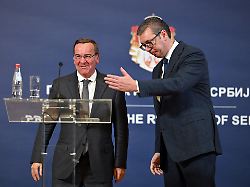“There is no way out of conflict in the EU”
Pistorius urgently warns Serbian President Vucic
February 7, 2024, 7:24 p.m
Listen to article
This audio version was artificially generated. More info | Send feedback
“Very productive, open exchange” – these are the words Defense Minister Pistorius used to describe his conversation with Serbian President Vucic. The diplomatic words show that things were clear. With all his assurances, the host makes it clear that nothing will be forced on him.
Defense Minister Boris Pistorius has called on Serbian President Aleksandar Vucic to help ease new tensions in the Balkans. “We must work together to prevent a spiral of escalation, regardless of whoever controls it. We must do everything we can to ensure that tensions are not inflamed. And it must be clear: violence and threats are not a means of political conflict, anywhere world,” said the SPD politician in Belgrade at a meeting with Vucic. Pistorius warned the Serbian president and other actors in the region: “No path leads to the European Union through conflicts in this region.”
After the conversation, Pistorius spoke of a “very fruitful, open exchange,” which also discussed the situation in Bosnia and the ongoing secessionist tendencies of the Bosnian Serbs. “We assume that Serbia does not support any secessionist moves, for example in the Republic of Srpska, but rather advocates for the stability of the region and for the integrity of the respective national territory,” he said.
The Serbian President spoke of a “very open, sincere” conversation. He further explained that there are different views on Kosovo and other issues, but that his country is interested in stability. “Serbia will not surprise anyone with military measures,” he said. “My word is worth more than any signature.” At the same time, Vucic made it clear that he would not allow anything to be imposed on him, not even from Washington, Berlin or Moscow.
Russia is active in the Balkans
Hours earlier, in the Bosnian capital Sarajevo, Pistorius had spoken out in favor of ramping up military security for peace in Bosnia-Herzegovina if necessary. During a visit to Sarajevo by the EU mission Eufor Althea, he reiterated the Allies’ determination to preserve the sovereignty and territorial integrity of the State of Bosnia-Herzegovina. “In Serbia and in the Republika Srpska in Bosnia and Herzegovina, Russia repeatedly finds breeding ground for its attempts to destabilize the region and expand its own influence, for example through disinformation campaigns and influencing the media,” warned Pistorius. “The resulting tensions in the Western Balkans require us to continue and, if necessary, intensify our stabilization measures in consultation with our local partners.”
He speaks from the perspective of NATO and the EU. The Bundeswehr has stationed around 30 men and women in Bosnia – with the aim of contributing to stabilization. Eufor Althea’s central task is to support the Dayton Peace Agreement, which ended the Bosnian war in 1995. However, the country remains a possible source of conflict. The soldiers contribute to an information picture through patrols, contact with the population and institutions and their own situation reports. Pistorius had visited the Kosovo capital Pristina the day before.
